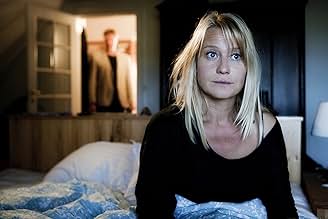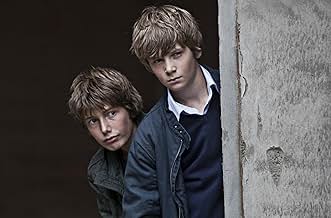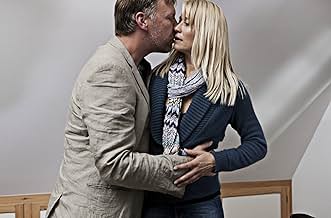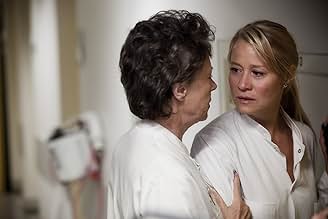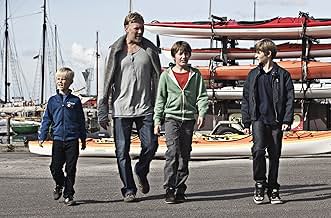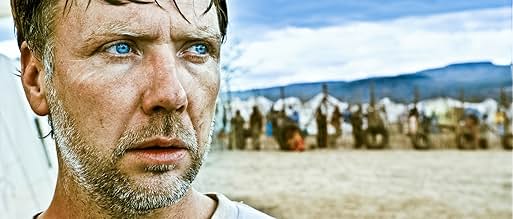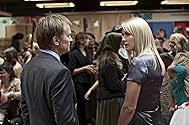The lives of two Danish families cross each other, and an extraordinary but risky friendship comes into bud. But loneliness, frailty and sorrow lie in wait.The lives of two Danish families cross each other, and an extraordinary but risky friendship comes into bud. But loneliness, frailty and sorrow lie in wait.The lives of two Danish families cross each other, and an extraordinary but risky friendship comes into bud. But loneliness, frailty and sorrow lie in wait.
- Won 1 Oscar
- 14 wins & 24 nominations total
Wil Johnson
- Najeeb
- (as Will Johnson)
Eddy Kimani
- Patient
- (as Eddie Kimani)
Mary Ndoku Mbai
- Patient
- (as Mary Nduku Mbai)
William Jøhnk Nielsen
- Christian
- (as William Jøhnk Juel Nielsen)
Satu Mikkelinen
- Hanna
- (as Satu Helena Mikkelinen)
Featured reviews
This film is recommended.
"For every action, there is an equal and opposite reaction."
Two Danish families, worlds apart in their ideologies and circumstances, come together in Suzanne Bier's Oscar winning foreign film, In A Better World. Screenwriter Anders Thomas Jensen takes two parallel stories about parallel lives that converge. Although the screenplay doesn't consistently mesh the duality of its concept, with scenes of African turmoil in sharp contrast with idyllic Danish villages, it does provide thought provoking mediation about the subject of revenge and its impact on violence, death, and day-to-day hardships faced by some minorities in our global realm.
Family No. 1: Anton (Mikael Persbrandt), a Swedish doctor who works in Sudan treating victim of war crimes, tries to be a principled and ethical pacifist, an idealist lost in an ungodly world. He confronts conflict at work and in his private life as his marriage to Marianne (Trine Dyrholm) is floundering. His son, Elias (Markus Rygaard), is dealing with bullying at school and his parents' possible divorce at home.
Family No. 2: Claus (Ulrich Thomsen), a recently widowed and grieving father and his son, Christian (William Johnk Nielsen), who blames his father for his mother's death and cannot adapt to the loss of his mother. Both troubled souls move from London to start a better life.
When Christian defends Elias from the school bully, both boys become instant friends and begin a dysfunctional bonding to survive a world that they perceive as riddled with injustice. Later, an disturbing incident occurs between Anton and another parent which triggers the two boys into righting a wrong in a most extreme way. No longer wanted to be victims, they instead become the oppressors.
Complex issues abound in this film. At some point, each character's action causes an act of retribution, a penalty for their misconduct, but not always the most deserving of punishments. In this unfair world of ours, the turning of a cheek may result in injury rather than reward. Karma is at work and actions decide our fate. We witness the ill treatment of people victimized with global acts of mistreatment and persecution in each country and are unprepared for the film's stark reality. It is the universal atrocities that prevails in our lives that rankles the core of this film and give the film its undeniable power.
This is definitely a Message Movie with a capital M, although sometimes the message is a mixed blessing, becoming a sermon at the pulpit in Bier's skillful hands. The scenes from Africa seem a bit heavy-handed and just don't correlate with the majority of the more interesting story set in Denmark. It also becomes a tad melodramatic in the end. Yet, one has to admire the noble effort and deeper personal vision of this film as it tackles major issues that are so scarce in today's cinema. The acting, especially the young actors, is exceptional.
In A Better World could have been a better film if the story would have concentrated more with the family dynamics and the psychological effects that compound a child's indefensible adult world. But Bier's film is still one of the better example of filmmaking that will more that satisfy the intellectual and more serious-minded moviegoer today. GRADE: B
NOTE: Visit my movie blog for more reviews: www.dearmoviegoer.com
"For every action, there is an equal and opposite reaction."
- Isaac Newton
Two Danish families, worlds apart in their ideologies and circumstances, come together in Suzanne Bier's Oscar winning foreign film, In A Better World. Screenwriter Anders Thomas Jensen takes two parallel stories about parallel lives that converge. Although the screenplay doesn't consistently mesh the duality of its concept, with scenes of African turmoil in sharp contrast with idyllic Danish villages, it does provide thought provoking mediation about the subject of revenge and its impact on violence, death, and day-to-day hardships faced by some minorities in our global realm.
Family No. 1: Anton (Mikael Persbrandt), a Swedish doctor who works in Sudan treating victim of war crimes, tries to be a principled and ethical pacifist, an idealist lost in an ungodly world. He confronts conflict at work and in his private life as his marriage to Marianne (Trine Dyrholm) is floundering. His son, Elias (Markus Rygaard), is dealing with bullying at school and his parents' possible divorce at home.
Family No. 2: Claus (Ulrich Thomsen), a recently widowed and grieving father and his son, Christian (William Johnk Nielsen), who blames his father for his mother's death and cannot adapt to the loss of his mother. Both troubled souls move from London to start a better life.
When Christian defends Elias from the school bully, both boys become instant friends and begin a dysfunctional bonding to survive a world that they perceive as riddled with injustice. Later, an disturbing incident occurs between Anton and another parent which triggers the two boys into righting a wrong in a most extreme way. No longer wanted to be victims, they instead become the oppressors.
Complex issues abound in this film. At some point, each character's action causes an act of retribution, a penalty for their misconduct, but not always the most deserving of punishments. In this unfair world of ours, the turning of a cheek may result in injury rather than reward. Karma is at work and actions decide our fate. We witness the ill treatment of people victimized with global acts of mistreatment and persecution in each country and are unprepared for the film's stark reality. It is the universal atrocities that prevails in our lives that rankles the core of this film and give the film its undeniable power.
This is definitely a Message Movie with a capital M, although sometimes the message is a mixed blessing, becoming a sermon at the pulpit in Bier's skillful hands. The scenes from Africa seem a bit heavy-handed and just don't correlate with the majority of the more interesting story set in Denmark. It also becomes a tad melodramatic in the end. Yet, one has to admire the noble effort and deeper personal vision of this film as it tackles major issues that are so scarce in today's cinema. The acting, especially the young actors, is exceptional.
In A Better World could have been a better film if the story would have concentrated more with the family dynamics and the psychological effects that compound a child's indefensible adult world. But Bier's film is still one of the better example of filmmaking that will more that satisfy the intellectual and more serious-minded moviegoer today. GRADE: B
NOTE: Visit my movie blog for more reviews: www.dearmoviegoer.com
Like anything, people will offer their own view of things. This is my own.
There are many films out there that focus on bullying and its effect on the children that experience it. A few will go further to picture the consequences to those children as they become adults, some of whom will never overcome that.
But it was the first time, from my perspective, that a film ventures to show bullying by an adult. As the stories (in Africa and in Denmark) run in parallel, it makes one wonder what the child bully would become if he were not stopped.
Brilliantly told, it left me with a sense that in our days we are still not taking bullying as seriously as we should. So how can the bullies ?
There are many films out there that focus on bullying and its effect on the children that experience it. A few will go further to picture the consequences to those children as they become adults, some of whom will never overcome that.
But it was the first time, from my perspective, that a film ventures to show bullying by an adult. As the stories (in Africa and in Denmark) run in parallel, it makes one wonder what the child bully would become if he were not stopped.
Brilliantly told, it left me with a sense that in our days we are still not taking bullying as seriously as we should. So how can the bullies ?
Each with a young son who is being severely bullied at school. The idea of bullying is the point of departure for a look at related issues, especially the idea of revenge. The original Danish title was actually that single word---revenge. It was changed (the new title is somewhat of a stub ) for the International release, probably for the better, at least for the USA since the original title would probably conjure the notion of an action film with a minimum of delicacy instead of what it is, a rather heavy-hitting soap opera that deals with the inevitable emotional upheaval with a modicum of nuance here and there.
The movie asks how does one handle this sort of humiliating experience. This theme is enlarged by the fact that one of the fathers is a doctor who treats patients at a Sudanese refugee camp and has to deal with roving warlords. Back home this father makes what what comes across as a wise decision in turning the other cheek when he himself is bullied and lightly pushed around by a neighbor mainly because the offense was relatively light weight but could have escalated into something of a serious and perhaps far-reaching consequence.
So what do you do when such discretion is lost on your 10-year-old son who thinks you're a coward and calls you a wimp? The teleplay makes clear that domestic corporal punishment or no dessert for a week is not the answer, it wants to mean business and point to a more non-visceral response. This episode is thematically important and hits home with its direct simplicity and urgency but is subservient in scope to what these two young boys are up to.
There is backstory where a mother has died of cancer in one family, and a separation is in progress in the other, both that take a toll on the two young boys. Danish actress Trine Dyrholm pulls off an incredibly charged scene where she stumbles upon the neighboring boy in the hall of a hospital towards whom she has an uncontrollable and justifiable anger when she suddenly realizes that she is talking to a child, a child the same age as her own. The struggle in betraying a sudden compassion in such a circumstance is extraordinary.
Wisely, the teleplay imposes an interruption to the scene, otherwise the whole thing might have been ruined by either over sentimentality or rank incredulity. As is, it is terrific and I still have not been able to quite get it out of my mind.
The movie asks how does one handle this sort of humiliating experience. This theme is enlarged by the fact that one of the fathers is a doctor who treats patients at a Sudanese refugee camp and has to deal with roving warlords. Back home this father makes what what comes across as a wise decision in turning the other cheek when he himself is bullied and lightly pushed around by a neighbor mainly because the offense was relatively light weight but could have escalated into something of a serious and perhaps far-reaching consequence.
So what do you do when such discretion is lost on your 10-year-old son who thinks you're a coward and calls you a wimp? The teleplay makes clear that domestic corporal punishment or no dessert for a week is not the answer, it wants to mean business and point to a more non-visceral response. This episode is thematically important and hits home with its direct simplicity and urgency but is subservient in scope to what these two young boys are up to.
There is backstory where a mother has died of cancer in one family, and a separation is in progress in the other, both that take a toll on the two young boys. Danish actress Trine Dyrholm pulls off an incredibly charged scene where she stumbles upon the neighboring boy in the hall of a hospital towards whom she has an uncontrollable and justifiable anger when she suddenly realizes that she is talking to a child, a child the same age as her own. The struggle in betraying a sudden compassion in such a circumstance is extraordinary.
Wisely, the teleplay imposes an interruption to the scene, otherwise the whole thing might have been ruined by either over sentimentality or rank incredulity. As is, it is terrific and I still have not been able to quite get it out of my mind.
Saw this in Toronto and it remained with me for days afterward. Shattering filmmaking! The size and elegance of a Hollywood big budget, with the honesty and challenge of an indy. The performances, especially those of the two boys, are riveting, but I was also impressed with the deep focus photography, the haunting score. Went to see this because I had so enjoyed After the Wedding - but feel this is even better. Only the ending conflict resolution is, perhaps, a little too easy-- but not unearned. And oh boy, was I grateful for it. I want to see this with my son, because I want him to experience the moral and emotional snake pit Bier and her screenwriter toss us into: every guy --no matter what age-- will get it, and none of us will like it very much. To me, Bier speaks about what it SHOULD mean to be a man. Is vengeance built into our genes? I hope not. And I hope this wins the Academy Award this year, and everybody in America goes to see it.
This movie is a far more direct and disturbing probe into some of our more troubling inclinations than anything I've seen since becoming a fan of Lars von Trier's movies. The topic here is vengeance and its consequences, more or less. I was a little surprised to find it had been directed by a woman, Susanne Bier. I've always thought women would be good at this kind of near melodrama but have never actually seen one tackle such a project, to my knowledge. The story centers around two boys and their developing reaction to first school house bullying, but then a much more serious instance of it in their home life. The acting is beautifully done and none of the leads seem to have held back in the slightest. One dad is a doctor who, it appears, donates his services to a part of Africa wrought with violence. Despite his obvious good nature, he and his wife, also a doctor, are having problems.
It's unusual in my experience to have a woman show just how much more selfless a man might be than his wife, but that is exactly what is done here. And it's quite refreshing. But the sweep and breadth of this movie is quite satisfying on its own, spanning from Africa to modern day Denmark. This is a trip I wouldn't hesitate recommending to anyone.
It's unusual in my experience to have a woman show just how much more selfless a man might be than his wife, but that is exactly what is done here. And it's quite refreshing. But the sweep and breadth of this movie is quite satisfying on its own, spanning from Africa to modern day Denmark. This is a trip I wouldn't hesitate recommending to anyone.
Did you know
- TriviaThe Danish title 'Hævnen' translates into English as 'Revenge'. Susanne Bier mentioned that she prefers the English title 'In a Better World' which emphasizes the hopefulness of the film while the Danish title emphasizes the severeness of the film (at 1:52:49 in the Blu-ray director's commentary).
- GoofsWhen Anton (Michael Persbrant) performs his first surgery he scratches his head/corrects the position of his mask after having put on sterile gloves (at around 42 mins) thereby contaminating them and risking that the patient gets infected. A real surgeon would never do this, and if she or he did, she or he would change gloves.
- ConnectionsFeatured in DR2 Premiere: Episode #4.1 (2010)
- How long is In a Better World?Powered by Alexa
Details
- Release date
- Countries of origin
- Official sites
- Languages
- Also known as
- In a Better World
- Filming locations
- Production companies
- See more company credits at IMDbPro
Box office
- Budget
- $5,500,000 (estimated)
- Gross US & Canada
- $1,008,098
- Opening weekend US & Canada
- $33,058
- Apr 3, 2011
- Gross worldwide
- $13,004,504
- Runtime
- 1h 58m(118 min)
- Color
- Sound mix
- Aspect ratio
- 2.35 : 1
Contribute to this page
Suggest an edit or add missing content


